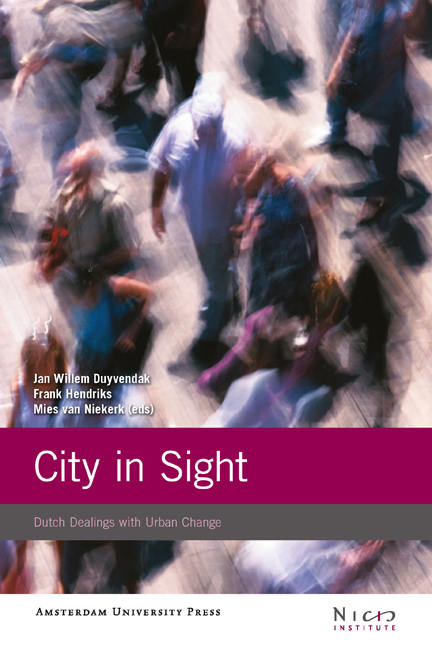Book contents
- Frontmatter
- Contents
- Acknowledgements
- Cities in Sight, Inside Cities: An Introduction 9
- Part I Urban Transformations and Local Settings
- Part II Urban Citizenship and Civic Life
- Part III Urban Governance and Professional Politics
- The Dutch Orange and the Big Apple: A Comparative Commentary
- References
- Notes on Contributors
- Index
13 - The Amsterdam Office Space Tragedy: An Institutional Reflection on Balancing Office Space Development in the Amsterdam Metropolitan Region
Published online by Cambridge University Press: 19 January 2021
- Frontmatter
- Contents
- Acknowledgements
- Cities in Sight, Inside Cities: An Introduction 9
- Part I Urban Transformations and Local Settings
- Part II Urban Citizenship and Civic Life
- Part III Urban Governance and Professional Politics
- The Dutch Orange and the Big Apple: A Comparative Commentary
- References
- Notes on Contributors
- Index
Summary
Introduction
Spatial problems increasingly transcend administrative boundaries. Answers to questions regarding new spatial dynamics have to be found in the urban networks, with a multitude of different interests and conflicts. The urban regions, often undefined politically-administratively, are becoming the playing field in which policy-making and its execution should occur (Healey et al. 1997). The fragmentation within the urban regions, the internal competition and the often uneven distribution of costs and benefits, however, often limit the creativity in which spatial developments take place (Levy 1992; Goetz & Kayser 1993; Salet et al. 2003; Stein 2005). A coordination dilemma exists (Scharpf 1997). Attempts to address the absence of a ‘problem owner’ at the super-local scale by amendments in governing mechanisms were often difficult to implement or did not achieve the envisaged results (Phares 2004). Increased comprehensive and high-qualitative development in a region requires an increased level of effectiveness from the various government levels (local, regional and (supra-) national) in their collaborations (Calthorpe & Fulton 2001; Porter & Wallis 2002) and operational strategies of collective action between and within the relevant scales (Hooghe & Marks 2001). The ultimate partnership in an interactive governance process is the formation of a self-governing network. Such a network includes the establishment of a level of mutual understanding and embeddedness in order to develop a shared vision and jointworking capacity (Stoker 1998, 22-23) with interdependencies between actors and relaxed hierarchical levels. As Gualini (2002, 33, emphasis in original) argues ‘the challenge for governing and managing action becomes that of co-production, of the pursuit of joint results from the activity and initiative of multiple social actors.’
In this chapter we will discuss to what extent horizontal co-productions of policy-making via direct exchange of public interests result in more effective governing and managing action at the metropolitan level. Our research focused on possibilities for balancing and redistributing developments in urban regions based on international exploratory case-study research in the UK and the USA. In this chapter, the case of the Amsterdam office space oversupply due to intraregional competition in the region is used as an example of a collective action problem. Some background on these collective action problems will be provided in the next section. In the following section we elaborate on the office oversupply policy problem in more detail.
- Type
- Chapter
- Information
- City in SightDutch Dealings with Urban Change, pp. 249 - 266Publisher: Amsterdam University PressPrint publication year: 2009
- 2
- Cited by



